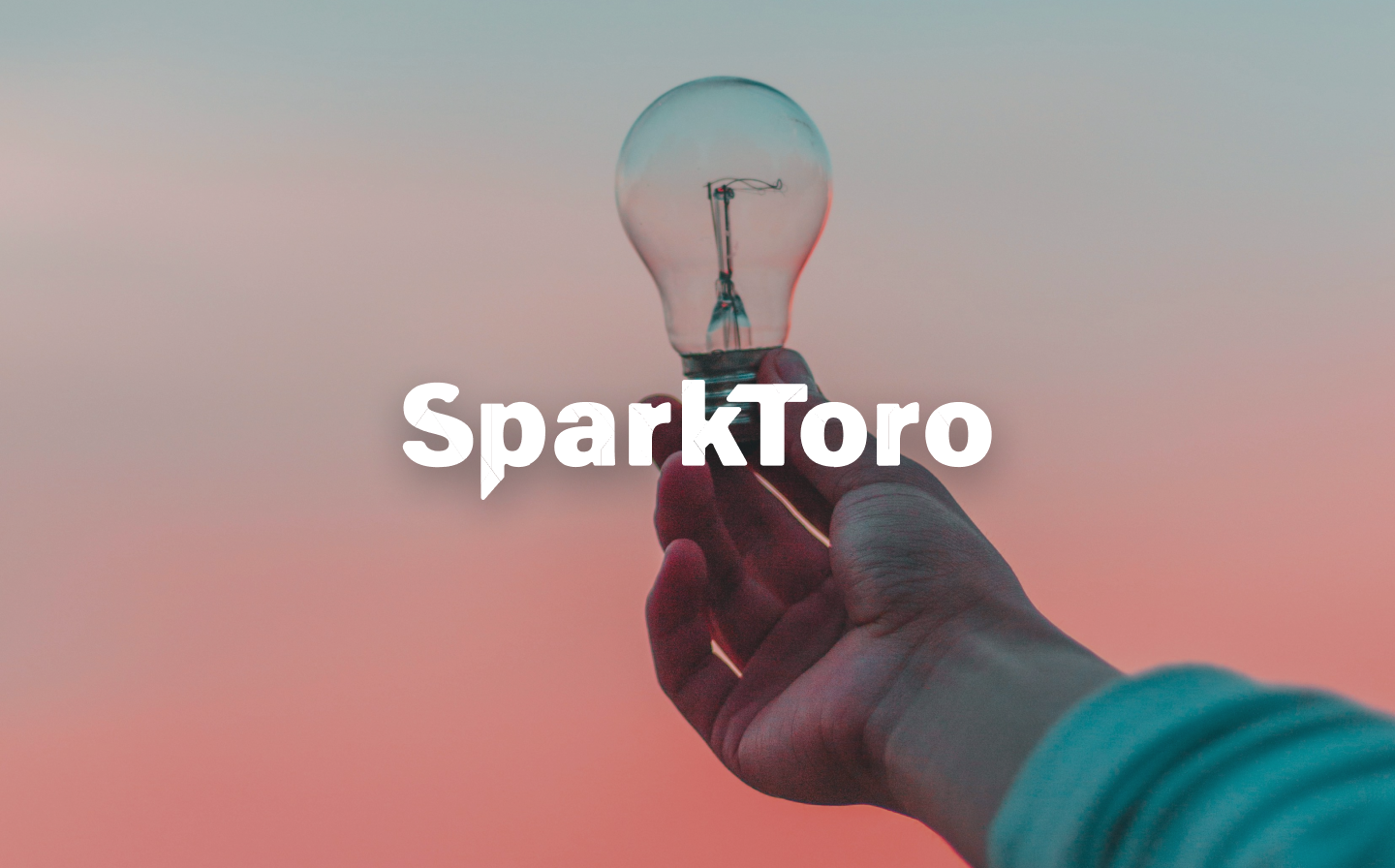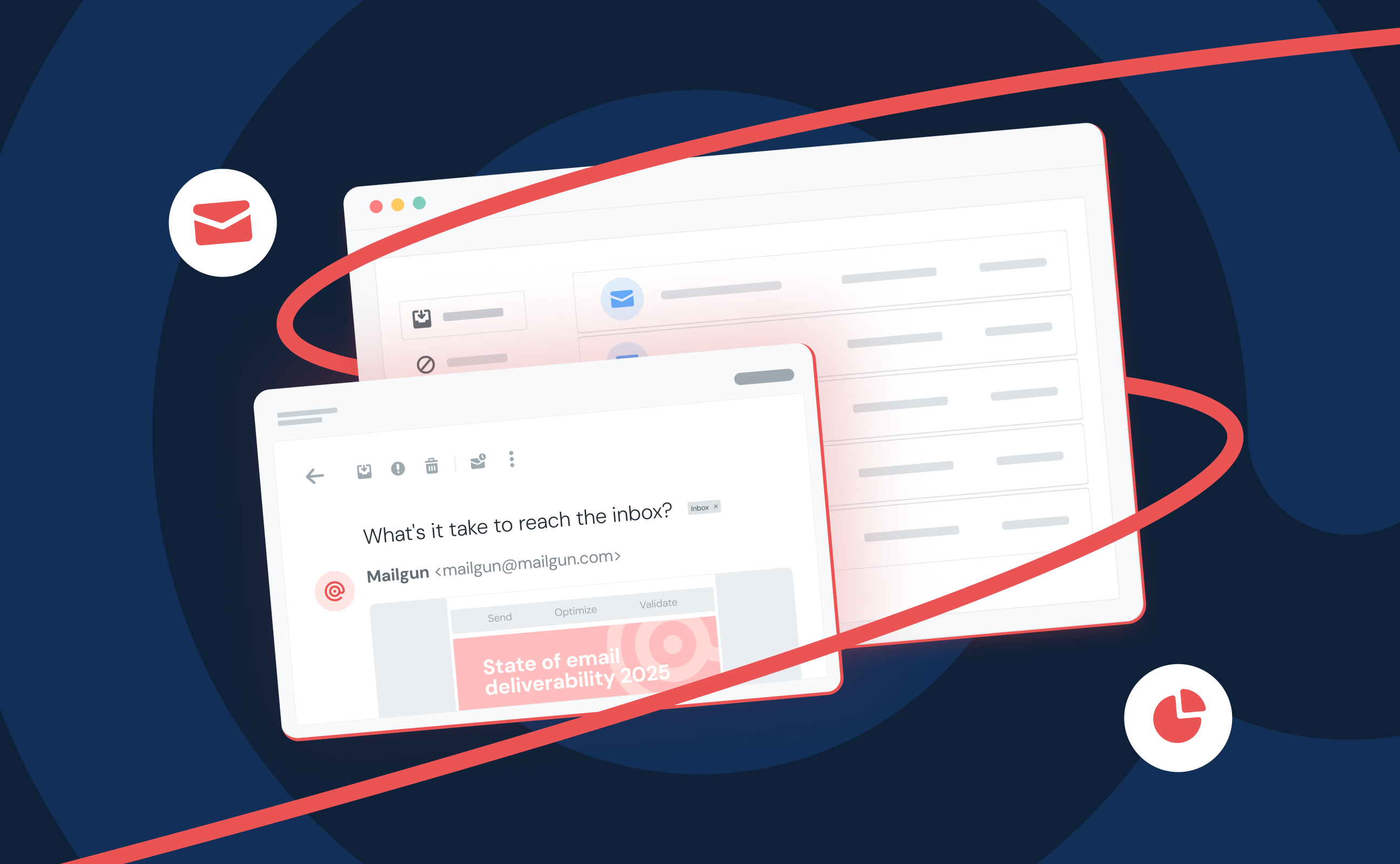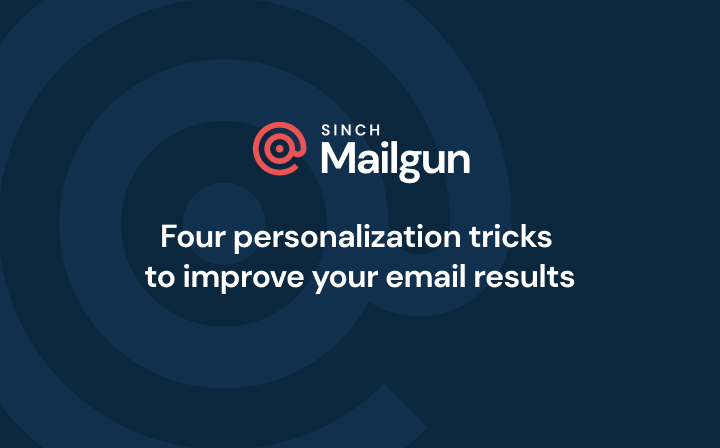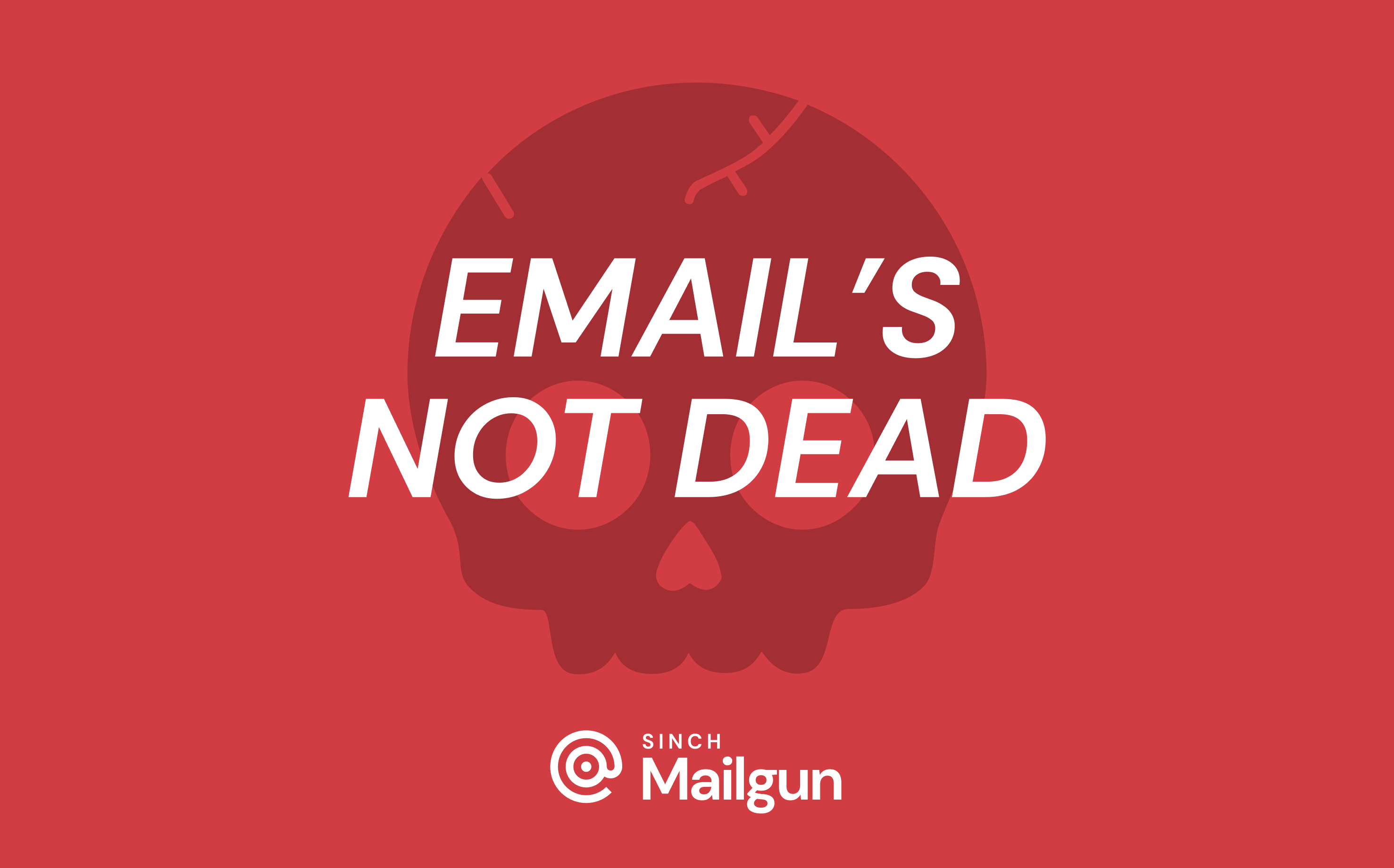Podcasts
Matthew Smith of Really Good Emails wuz here!
Email’s Not Dead: Season 3, Episode 3
Matthew Smith of Really Good Emails wuz here!
Email's Not Dead
About this episode:
We’re big fans, I mean really big fans of Really Good Emails. Such big fans that we had to get CEO and Co-founder Matthew Smith on the show to know a bit more about the history and future of Really Good Emails. Enjoy tidbits on Yoda, the love of buying musical instruments online, and of course…email.
PUBLISHED ON
Meet your presenters

Jonathan Torres
Manager of the TAM team at Sinch Mailgun

Eric Trinidad
Technical Account Manager II at Sinch Mailgun
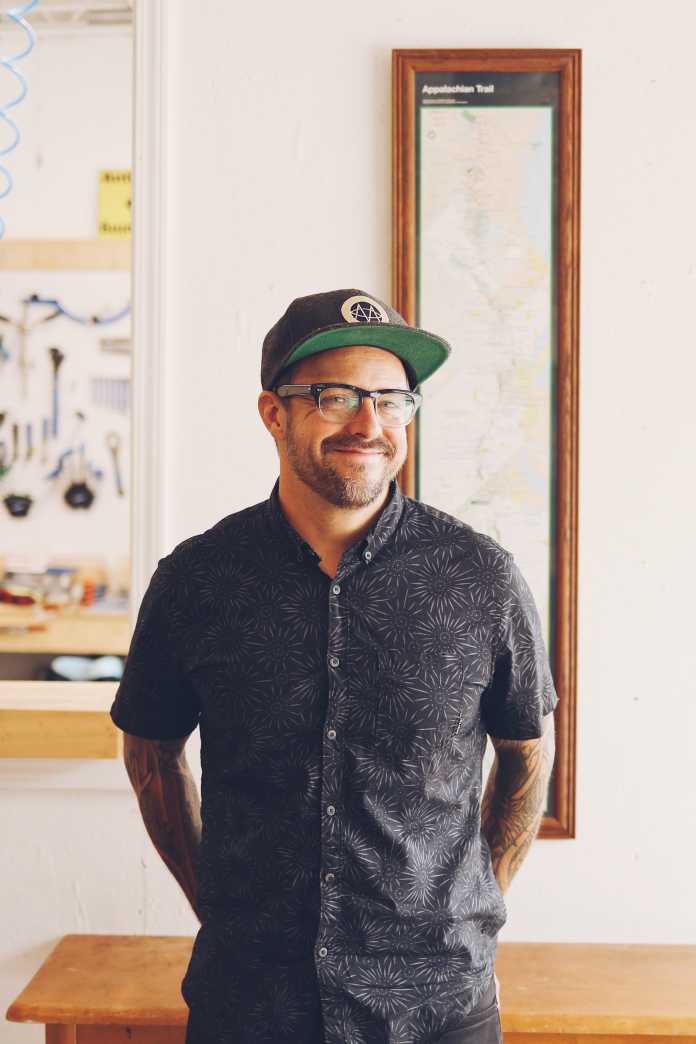
Matthew Smith
Founder and CEO of Really Good Emails
Show notes and resources
transcript
Email’s Not Dead – S3, E3: Matthew Smith of Really Good Emails wuz here!
Overview
00:00:20 - Meet Matthew Smith of Really Good Emails
00:01:28 - More awareness about how we relate to our customers
00:00:04
Eric Trinidad: Welcome to emails not dead. My name is Eric and this is Johnathon. Hello?
00:00:08
Jonathan Torres: Hello.
00:00:10
Eric Trinidad: We're your earbuddies to take you along a journey through all things email. Thanks for joining us. Jonathan, how are you doing today, sir?
00:00:17
Jonathan Torres: I'm good, yourself? Feeling good. Yeah.
00:00:20
Eric Trinidad: I'm doing great thanks for asking. I'm feeling actually really good because we have a really good guest today. Matthew Smith, CEO from Really Good Emails. Matthew Smith, how are you doing today, sir?
00:00:31
Matthew Smith: I'm wonderful. Grateful to be here. Grateful to be alive, grateful to be working in email. It's a fun day.
00:00:39
Eric Trinidad: Yeah, yeah. Right on. Well, we're grateful very much to have you. Thank you so much for taking the time to meet with us today. And you know, you know, listening to you speak in the past, I feel like we're natural buddies like you, you preach, you know, being good. We try to tell our customers to be good and email service providers will treat you good. So I feel like this is a long time coming.
00:01:07
Matthew Smith: I love it, man. Yeah, let's build the tribe.
00:01:10
Eric Trinidad: Yeah, yeah, we'll get the word spread, that's for sure.
00:01:16
Jonathan Torres: As you say that like my imagination turns to like the Venn diagram kind of stuff like of overlapping circles just coming together. And it's just like, so close together. I love it so much.
00:01:28
Matthew Smith: It's a good time to be alive, you know, like despite all the, you know, challenges that are happening where we have more political discord than we've had in a long time. And you know, we just are coming out of potentially a pandemic that, you know, is sort of trailing and won't let go. But there's also more awareness about how we act together relationally all the time. There's more awareness about how we relate to our customers and the effects that that has all the time. And with this awareness, we have the capability to do things better all the time. And I love this new information. You know, for me, about five and a half years ago, I quit drinking. I got divorced. Life hit the fan. But that was the beginning of a new life for me, and I really was able to learn some hard things about myself and begin to work on those things. And since then, you know, being able to develop an awareness for the times that I'm acting narcissistically or the times that I'm being, you know, very self focused are the times that I'm acting out of anger. Spending time in my amygdala instead of my prefrontal cortex, you know, like this awareness allows me as an individual to behave, you know, in a way that is much more loving to the people I care about and honestly to people I don't care about. But what gets me excited then to translate that information over to our, you know, abilities to do this with our customers, with our audience, you know, to think about them, to think about their experiences, what are they moving through? What challenges are they facing in their life? And how can I support them? How can I encourage them? How can I be grateful for their, you know, for being a part of the audience? Mm hmm. And in doing that, there's just so much joy in being able to play what I like to think of as the Yoda in the story, right? Like for really good emails, we position ourselves that way so that the Skywalker family, whether it's Rey or Luke or Leia or anybody else, you know, they get to be the heroes in the story and we get to support them instead of claiming that for ourselves. And for me, that's that's an extension of my personality. I, I much prefer being able to support other people and see how they can succeed. And I just get a lot of value out of that meets a lot of needs for me. But it's neat when you can then translate all that kind of stuff into even an email. Right? When we get to understand how people are like, how a customer is feeling, maybe in their lives, when we maybe do surveys or find out what's going on for them and then we can serve them content that matters. And this is, you know, personalization. But if you do it with a little bit of empathetic framing, it can be that much more powerful. So it's a good time to be alive.
00:04:29
Eric Trinidad: Yeah, I for sure. Putting yourself and your customers shoes like we get that, you know, as well, you know, we don't want to bombard our customers with messages we don't want to cause, like mailbox fatigue, because on the recipient end, like we like to tell our customers, like why would you continue to send to them that way? Like if you were receiving all those messages, you'd just be overwhelmed. You get anxious, your phone is constantly ding, ding, ding, ding, ding, ding. You don't even know what's happening, you know so and it's not always good information. So you know why, you know, why would you want to do that? You know, just know who you're sending to. You know, your audience right now.
00:05:05
Jonathan Torres: Know your audience. And yeah, and I mean, to kind of get back to that point. Well, first of all, you're speaking my language like with all the Star Wars references because I get it. I understand right there. And I think what what ends up helping is just kind of like that and paying respect to that portion of it. And that's just a good way to think about it in the time that we're in right now, because I really think that so much that, especially right now, is just so critical and so important because I mean me as as a consumer of things like I know every time I hear news about like things that I want and that I'm ordering and I'm wanting to get right now and with the current climate and the, you know, with the pandemic and supply chain stuff and things going on, it's like, you know, somebody's doing something and sending me something in a very sympathetic way is just so much more helpful. And it just helps relax me and, you know, even them providing context of when they're sending out stuff like and why that's happening and, you know, allowing me giving me that information. And that's just so it makes me feel better when it's like that. And not just some robotic message that comes out saying, Hey, like, this is what's going on, and that's it. And, you know, good luck, you know, and it's just it just feels so much different. And yeah, I mean, I completely hear you on that point.
00:06:16
Matthew Smith: Hmm. Yeah. I think there's something special that can happen when an organization of business takes that extra minute to consider others. So much of email communication and marketing communication is "Let me tell you about me". Let me tell you about us. Let me tell you about the things that we're doing. Here's why you should buy when there's such an opportunity to say, you know, tell me more about you. What challenges are you facing? What do you wish we would do differently? You know, imagine it in a relationship, right? Like I know for my girlfriend, one of the most important things I can do when I wake up. Hey, how are you feeling this morning? How can I support you today? What can I do to make today like the best day possible? And she feels connected. She feels supported. I know that because I've spent time getting to know her needs right. Those are some of her strong needs. And therefore, she's more inclined then to, you know, be interested in also connecting with me about my needs and some of my interests. And I think when we develop that relationship with our customers, that is a lot more attentive than we really can grow business. You know, it doesn't have to be empathy because it's good for humanity, and that's like the end of the story. It can be really great for the bottom line, and you build great brand doing it.
00:07:46
Jonathan Torres: Yeah, yeah. Yeah, definitely. And I mean, I mean, now we're kind of like in that that question, and that's what we want to know about you, what do you see that as kind of bringing into the world for those kind of purposes?
00:08:13
Matthew Smith: Well, when I started Really Good Emails, it started because there weren't enough. It was difficult to find the examples of who was doing the best stuff out there, right? I had been a creative director and a chief creative officer and a VP of product design on three different VC backed startups. And I wasn't I wasn't able to find the examples that I was looking for easily. And I thought, this is a problem. You know, email is actually connecting with the audience, sometimes more than the product is. And so shouldn't we have fantastic examples of email design the same way that we have for product design? And so I set out to change that and fast forward seven years, which is insane. You know, we're a team of four people, four owners, I should say. And we are all part time. So we all have other full time jobs. So we've been doing this on the side the entire time, and we have some additional writers and designer and a developer and some different things we're doing. But what we're trying to do now is we know that we have over 9000 examples now where we're people are getting for design inspiration. They're getting it for strategy inspiration, content inspiration. And the next step for us is we want to be able to help people do something with that material. And so we're actually creating a product that allows people to, from their Gmail inbox or from our collection, grab any email they want using a browser extension, pop it into their library within really good emails, and then start commenting about it as a team. Annotating it, drawing on it. And that's mobile desktop, you know, dark mode code the whole thing so that there's a central place for a team to be able to talk about those emails. And for us, the ethic there is when a team starts working on an email together and in a in an environment there's so much better than a Gmail label or forwarding it to a team where it gets broken and you, you know, then you can't talk about mobile and desktop and all the things, but in an environment that really is appropriate for this amazing medium, then we can have better discussions around how to improve an email, make it more empathetic, make it more personalized, make it more effective at the business level. And we can also start slurping in our competitions emails and see how maybe they're doing at that right. We can learn from others. And you know, one of the tools that we're bringing in is the ability for you to have an email address where you can just go subscribe to your competition and buy their products and so on and so forth. And that email just automatically comes into folders within really good emails. So you've just got it there as a team to be able to review that. The goal is we want more exposure of what is currently hidden in other people's inboxes. Right. So we think about it as the team inbox. The reason we do this is we believe that transparency allows for teams to be able to create what we think of as really good emails, right? Positive design, positive ethics, moving the needle forward. And we also can call out emails that really suck, you know, like if an email is is in our set like ours as a company maybe has a dark pattern or we're not listening to the customer. Well, then we can address that. A lot of times even though these ISPs provide you access to all your emails, they're often broken up into snippets. And so you're not seeing the full email and you're not seeing the full array of all your emails. This gives you the opportunity to see all of that in one simple place because we know that when there's better transparency, not only what you're doing, but what the competition or maybe your partner companies or brands that you really respect. When you can really see all of that, you can learn, you can grow, you can up your game. And when we all up our game in email, then we start to see email, improve on return on investment. And when that happens, we all get better salaries. So I think that this is like, let's do it together. The people in the email industry, generally that skill set in another vertical gets paid more and and we really need to address this as an industry. And so one of the things that I'm interested in is creating more value in the chain for the email geek, you know, or the the marketing individual who's really skilled at running a full email stack when they can show that return on investment. Then, you know, they're going to add, you know, maybe 10, 20, 30, 40 thousand a year to that, you know, salary. So there's this term. I'm not Jewish by any stretch of the imagination, but I really respect this language. It's a word called Shalom that I've learned about from others. And it's apparently this idea of not just a peace that is lacking conflict, but sort of a sense of equilibrium and just enjoyment and wealth and equanimity and fortitude in all areas of life. And so, you know, this idea of shalom and everything is just an interesting term to capture, like what I think is possible between companies emailing people right and actually having a value exchange there rather than spam. And then email geek to email Geek. We're learning from each other very transparently and openly. Company the company. We're sharing information, you know, openly, transparently. This is the world I want to live in. So I'm trying to create it.
00:14:27
Jonathan Torres: Yeah, yeah, I like that.
00:14:29
Eric Trinidad: Yeah, that's awesome, man. There's a lot of positive energy to get thrown into email, and I feel like if I just had more really good emails coming from you, then my day would be better. That's for sure. So I guess with some of the clients, do you see that are coming your way? What are like the kind of gotchas that you usually see that they fall into but are consistent like across industries?
00:15:01
Matthew Smith: If I understand your question correctly what are the main traps that people fall into? Right? So one would be that most emails that we get in are over designed and what I mean by that is that people use too many colors, too many typefaces, too many what I would call visual elements. And so, you know, design is a language and it's the visual language. So I imagine if you're trying to speak to somebody and you're speaking too fast, it's hard to listen to them or if you're speaking way too slow, it's hard to understand what they're saying or if they're using multiple languages at once difficult to track. You're right. So with design, you want to reduce the communication to its essential nature, and a game that I like to play is called design golf. And the goal with golf is to get your score as low as possible, right? So the goal with design golf is that every time you have any difference in the design, whether it's a typeface difference, a color difference or you add a different kind of element, like even a line or space or whatever it is, every point of any difference is a point. And then just add up all your points and then compare to other emails you see that you think are really good and see if you can get your email to be a lower point value. Now there's a point of diminishing returns. You don't want to have so few differences that there's no distinction. But generally speaking, most people, you know, have too much difference. And so it's hard to scan an email and really be able to see what's there. The next is just content, you know, being able to lead with content that is actually serving people's needs. Usually again, it feels very narcissistic. So here's this thing about us. Here's the thing that you know we think you need more and more and more. Me, me, me. Instead of getting into a very personalized, you know, interactions and relationships. And it's as simple as, like my friend used to work for, Oh man, I can't remember the name of the company. They sell used audio equipment. And so there would be this reverb and they would sell this, you know, guitars and drums and flutes and everything else you can imagine. Well, you would just get one newsletter with all the sales on all of it. Right? Pretty overwhelming. But I've already shown you in my clicking history, you know, are in my buying history that I'm a guitarist. So why are you sending me all of this stuff right? Why not just show me sales on guitars? And then you can put a little piece of the bottom and says, Want to see sales on additional instruments? Check out here. Right? That feels like you're listening to me. So like if I talk to my girlfriend about science fiction all day, she's going to roll her eyes so hard it probably she's going to be in the hospital. She hates science fiction, right? So I've learned. No, that's not what we talked about. We need to talk about Friday Night Lights. You know, she loves Friday Night Lights, and this is a way that I can get some time with her that I enjoy, OK. So but every once in a while, I can be like, Can I tell you something I think you might like about science fiction? And maybe I'll get a little bit in, you know, or like we can talk about dune or something like that. But I think this is the thing that we got to get to know our customers and provide better content, right? So content design, I think a big one is scanability. So one of the things I like to do is it's a simple test, but squint your eyes, look at the email kind of zoomed out, squint your eyes and see if you can see different sections that are, you know, readable if you can. Then you've got the right kind of visual hierarchy to show somebody that they can scan through the email. That's, you know, another test. So these are the kinds of things that we find that are not very effective and why we often turn down submissions.
00:19:22
Jonathan Torres: Yeah, yeah, I know those busy emails. Like, I've definitely seen those before. You know, and it's funny because only those things relate to, I mean, just so many other things a long time ago in a different life. Like, that's one of the things that I did also is not necessarily marketing type stuff, but I come from a background in graphic design for T-shirts specifically. And it's it's one of those things where at the level that I was doing that, which was not a very high level, the customer's always right. And it's, you know, I would I feel like I would design design something that was, you know, simplified, really core to the heart of what they would want. And my worst experiences are always the customers that would come in and be like, Oh, that's cool, but why don't we add this and this and this? And then? Well, yeah. And when you get done with it, it's like, this isn't even like, I can't even tell what this is for anymore. And and It doesn't do that. And I think that I mean, T-shirts specifically are very clean should be, you know, telling a message if you want it to tell a message. I mean, look at Thomas' shirt like, I can see exactly what it's telling me, what it is, you know? And then you have those kind of things going on and man like email, I feel like, yeah, like that's one of the best things are one of the best concepts when you can get that that that razor edge and cut through to the heart of what you're messaging is and what you're trying to do. And man, like, yeah, I like that, and I appreciate when people view it that way.
00:20:45
Matthew Smith: Well, you know, you bring up a good point, which is that if I'm a designer or I'm on a team and somebody in another department is saying "Can we add this? Can we add that?" A good question to ask the team is, are we willing to risk having a noisy email that has so much in it that we're we're kind of yelling at our customer rather than focusing on giving them more potent information first? So it's just starting to ask those questions. And you know, another possibility is just to see if you can get a win. Like, try two versions and would you be willing to let me try my simpler version and see if we can get a better, you know, click through on this particular thing and we're trying to do and to do a qualitative test and connect with customers and see which one they feel better about. Right. So it's not always about click through. Sometimes it's about brand and being able to see how people relate to that. So it's worth doing.
00:21:57
Jonathan Torres: Yeah, yeah, definitely. Yeah. And that's awesome. Yeah. And I think that's kind of like another thing that I think has been the focus a little bit is what the brand is, right? What the what the sender is trying to communicate through that message. Is it always like a buy something or, you know, you know, here we are, come back to us kind of thing. It's a relationship that I think they need to keep in mind. And I know that's something that I definitely have talked to my customers in the past where it's like, you know, maybe not everything is going to get the best click through engagement and not have that. But I mean, the readability should be there always because communication with them about who you are, what you're doing and even when it is something that's just like, "Hey, here we are, we're here for you," you know, and here are some things that you might like that might necessarily translate to a sale, but it's something that is informative of who you are as a company.
00:22:51
Matthew Smith: Well, in that in that same way, one of the things that I'm perplexed by a lot of times is that brands will communicate to their customers in such a dry, non-personal way that they wonder why, you know, people don't open the emails. One of the reasons people open really good emails is that our newsletters are always funny. They're always goofy. And they often have something down at the bottom that's like, Holy shit, what? I didn't know they were going to put that in there. And that kind of thing to me is like part of our brand. But it also helps people keep coming back to read, right, that every time you're you're going to see if there's something funny, something interesting, something helpful, something that moves my career along. But you can expect that it's going to be a great conversation. We all know those people coming down the hall or that we haven't talked to in a while and you're like, Oh God, I guess I've got to answer this call, but this is going to be the most boring 45 minutes of my life. I hate, you know, but I feel obligated. But that's what so many of our email communications are like, you know? And but oh, well, sometimes they have sales on shoes, so I guess I'll open it to see if I have to do this like, you're missing this huge opportunity, you know what I mean? And so I think that's where brand comes in and a lot of companies kind of underspend on brand, they end up doing a logo, they end up getting their colors right, but they don't know how to create the promise of an experience. You know, Maya Angelo says, you know, people might forget what you did or they might forget what you told them, but they never forgot how you made them feel. And that's what we're looking for in that brand connection, you know?
00:24:37
Jonathan Torres: Yeah, yeah, definitely. It's that those emails that you keep around just, you know, to kind of get the sales every once in a while. And I know those items all too well, like.
00:24:47
Eric Trinidad: It's so crazy, just like because, oh, of course, we're not in the same room. You know, we're all in the Zoom conference and you just see everybody just nodding their head while you talk is just awesome. She's like, No, we're all on the same. We totally agree. We're right there with you and you're not so much, you know, I think you're more of a relationship expert at this point in time, right? Like just telling us how people should be with our emails, you know? And then also great relationship advice with you and your girlfriend as well.
00:25:19
Matthew Smith: Hopefully! You know, that is the funny thing for me. I don't I don't honestly consider myself an email expert. I have not spent that much time on the ground sending emails out of Klaviyo or Drip or, you know, campaign monitor or MailChimp or any of these. I've done my fair share. But what I know is relationship, and I know that relationship when it's built right is what can sell and create value like value is what gets me excited as an entrepreneur. And when we can meet a real need for a customer, that's exciting. It feels so good to do that in relationship and it feels good to do it in a transaction. But when I like for me, I have an Airbnb and I host as well, right? And so I have this setup where my cleaner, she leaves a card that is from a local shop. And then she reads, writes a handwritten note as though it's from me, and it basically says, You know, Hey, Kathy, I hope your trip from Ottawa really went well. It's wild to have you here in Greenville. Don't forget to go down to the coffee shop at Village Grind. Tell Lisa I said, "Hi," she's a great friend. Oh, and don't forget the lavender latte. It's my favorite. Have a wonderful trip, Matthew. Well, like, I've just trained my cleaner to know how to write that, you know, message to each person that comes. Every single review I get is it says Matthew left the most sweet and tender note. All you do is try and be a little bit personal. And I leave like chocolates and water, and I just they're coming off of a trip. I'm thinking about if I'm coming into an Airbnb where I've never been. What is the experience I'm looking for, right? It's the same thing in our emails. If we can master relationships, we're going to dominate because email gets a 42 percent return on investment. This is the number that gets thrown around, right. So if if that return on investment is possible, if we're not getting that, it means that we're not mastering our relationships. And the way to get there is to start learning about your customers and start trying to relate to them like a real human being. You know, it's weird. Like, we know this about our girlfriends or our spouses or our boyfriends or our partners. We know that like we, we even if we sometimes know I'm not doing very well at it, but at least we know right and then we move over to our business and it's like we turn that part off and we just follow these kind of like dry scripts about things that you're supposed to send. And we forget to be human. We forget to, like, connect with people. And the pandemic ends up being a really powerful time to be able to say, Hey, you know what? We're going to take the day off as a team today, and so we weren't going to send you our normal email. Here are five things that we're going to go do on our day off. I hope it encourages you to go get out. That's a human moment. And something that they wouldn't expect. They were expecting a shoe sale. But then instead, they got this opportunity to think about, huh? Fuck shoes. I'm going on a hike. You know, maybe I don't know.
00:28:44
Eric Trinidad: Maybe they need for us to go on to the hike?
00:28:48
Jonathan Torres: What if you just gotten the shoes to go on the hike. You know, you never know.
00:28:52
Matthew Smith: But I think there's something in that and that's what I care about, you know? And you know, I'm not I didn't arrive at being a person who cares so much about relationship on purpose. I failed at it so much that I have learned a lot along the way, you know? But I'm glad to be here.
00:29:09
Eric Trinidad: Yeah, no. That's the only way you learn is by failure. So it's good. It's good. You got there. You know you're working on the team collaboration project. But as far as like the goals for Really Good Email, where do you see yourself going?
00:29:24
Matthew Smith: Well, it's been an interesting year we've we launched a search for the CEO, a person that could take over my role. I'm a I'm an entrepreneur, I'm a visionary, but I'm not a numbers guy. And so, you know, the hypothesis then was somebody who could be full time on the ground all the time and really, you know, own that role well along the way. We started getting interested in acquisition and investment, all kinds of things. And so that's been an interesting question for us, like, where do we land? But one of the things that's so important for us is that really good emails remain agnostic to any one brand so that we can continue to provide value to our customers and to our audience. And so we've had to have kind of a, you know, a rethinking about who are we, where do we want to go? What's important to us? You know, we are not in it just for being good people. That is a great value. But you know, we'd like to make a good profit off the work that we've done. So we're looking for that magic spot where we can turn really good e-mails into a very profitable, very valuable business to our customers. We're hoping that this ability to collaborate and the ability to strategize is a space that we can really own and be extremely valuable. We are launching four new events and four on spam this year, so we've got one in Greenville. We've got one in London, Boston and Chicago, and we'll be launching information about that soon. And that's exciting. I have ambitions to launch the best job board in the lifecycle community and really be a place where we can not only have jobs but also freelance opportunities. And also people can have profiles like being able to tell their story within this space, things that they've done, things that they've worked on. And then if you've ever tried to look for courses out there on the internet, on email marketing or on lifecycle, they're spread all throughout the internet. Very difficult to find. So we'd like to create a directory for those things. So what we continue to do is we want to be the curators of all the best information on the internet, about email and marketing and to find ourselves continuing to be that Yoda in that story. And if we are winning there, then we think that we can provide value that's worth paying for. So in the next three to five years, we'd really love to scale up and we're going to start charging for what we do for the first time in our company lives. So it's going to be an interesting transition and we're excited about it and hope that our customers can share with us all the things that they're hearing and that they're feeling and learning so that we can learn from them. But we're excited. You know, for somebody who's done this part time like my full time job is I run a design agency called Bunsen that does creative services and positioning for biotech and life sciences. I care a lot about science. Science has really saved my life more than once, and I really want to be dedicated that to that. But I can't let go of email. I love this shit too much, it's weird. I never in a million years thought that, you know, Oh, who's Matthew Smith? You know that email guy like, Oh, OK, I guess that's me. But it's a good place to be, and I'm grateful for it. You know, really good emails wins when our customers and our audience continue to get better at what they do. That's how I know we're winning if we assisted in that opportunity. So if people out there are listening and have thoughts or feedback for us, I'm all ears and we really want to hear it. If you have ideas for, you know how you would use some of the tools that we've been talking about, let me know. But I'm excited about where we're going now.
00:33:33
Jonathan Torres: Yeah, that sounds awesome. And I mean, like, I know I can't speak too broadly, but I know at least within, you know, this little group. We're very thankful that you're so passionate about the email side of things because it really is. And when you speak about that stuff, man, I really like what I hear is, like, really good emails is being a really good beacon for community in the email space, and I think we need that. I really do like I think it's the more we can learn from each other, more we can talk about things, the more we can do those things correctly. And it just helps the whole space grow. And I'm all for that, right? Like you said earlier it's about bringing job progression and money into things. But man, I would love to have an inbox that I would love to go to every day, and I think you guys are on the way. So. And that's awesome, thank you.
00:34:21
Matthew Smith: I'm really grateful to be able to talk about it and have fun doing it, and, you know, the email community to me feels like the web design community about 12, 15 years ago. Everything feels, you know, people want to share information. We all want to help each other grow. It just feels like a really dynamic place. And more and more, it's more supportive of women and people of color and the queer community. And so it's this is very like integrated space, and I'm really proud to be part of it. So we just love to support anybody we can and anybody who needs that support, please reach out. We'd love to do that.
00:34:59
Eric Trinidad: Yeah, for sure. For sure. Matthew, thank you again for your time. I have nothing but grateful feelings for you being here. Thank you so much. If anybody is looking for more information, where can they find you, sir?
00:35:20
Matthew Smith: You can find us a Really Good Email on Twitter. Really Good Emails on Instagram. Twitter has this limited character set, so we just had to drop this and of course reallygoodemails.com. And then keep an eye out on new information by signing up for our newsletter. We would love to have you there where we have updated articles and curated content, and also share information about how to keep getting better at our jobs.
00:35:49
Eric Trinidad: Right on, right on. Well, thank you so much again. We know you can do it. There is no try. Have a great day, everybody.
